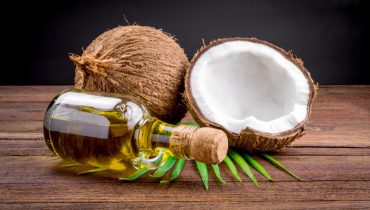The Superiority Of Coconut Oil In Hair Care

So coconut oil has been making the rounds in the good health community for a good few years now. This yummy healthy fat is extracted from the kernel or meat of matured coconut harvested from the coconut palm (Cocos nucifera). Throughout the tropical world it has provided the primary source of fat in the diets of millions of people for generations and not the nasty omega 6 heavy vegetable oils you get in the supermakets these days (yes I’m sorry but canola oil ain’t food!).
What does this have to do with hair care? Well it’s no secret that coconut oil has been hyped as an excellent hair oil for eons but what makes it different from any other oil is the fact that coconut oil is a triglyceride of lauric acid. It has a high affinity for hair proteins and, because of its low molecular weight and straight linear chain, is able to penetrate inside the hair shaft. This is why you will hear it occasionally described (in hair care) as the only moisturizing oil*. That’s not strictly accurate as the word moisture would imply the presence of water so it would be better described as the best conditioning oil.
Here is a study comparing the effect of mineral oil sunflower oil* and coconut oil on the prevention of hair damage.
Previously published results showed that both in vitro and in vivo coconut oil (CNO) treatments prevented combing damage of various hair types.
Using the same methodology, an attempt was made to study the properties of mineral oil* and sunflower oil on hair. Mineral oil (MO) was selected because it is extensively used in hair oil formulations in India, because it is non-greasy in nature, and because it is cheaper than vegetable oils like coconut and sunflower oils. The study was extended to sunflower oil (SFO) because it is the second most utilized base oil in the hair oil industry on account of its non-freezing property and its odorlessness at ambient temperature.
As the aim was to cover different treatments, and the effect of these treatments on various hair types using the above oils, the number of experiments to be conducted was a very high number and a technique termed as the Taguchi Design of Experimentation was used. The findings clearly indicate the strong impact that coconut oil application has to hair as compared to application of both sunflower and mineral oils.
Among three oils, coconut oil was the only oil found to reduce the protein loss remarkably for both undamaged and damaged hair when used as a pre-wash and post-wash grooming product. Both sunflower and mineral oils do not help at all in reducing the protein loss from hair. This difference in results could arise from the composition of each of these oils. Coconut oil, being a triglyceride of lauric acid (principal fatty acid), has a high affinity for hair proteins and, because of its low molecular weight and straight linear chain, is able to penetrate inside the hair shaft. Mineral oil*, being a hydrocarbon, has no affinity for proteins and therefore is not able to penetrate and yield better results.
In the case of sunflower oil*, although it is a triglyceride of linoleic acid, because of its bulky structure due to the presence of double bonds, it does not penetrate the fiber, consequently resulting in no favorable impact on protein loss.
With black hair we already have enough to deal with in terms of loss of moisture and breakage, loss of protein is not something I want to be worrying about so I happily use coconut oil both for sauteeing my vegetables and in my hair as a prepoo or before blowdrying. Go for pure unrefined virgin coconut oil brands that are not hydrogenated. Coconut oil* should have a mild sweet coconutty scent and tastes absolutely marvellous (I make a mean coconut oil* and cream cheese icing for cupcakes!).
You can find unrefined coconut oil in some health food shops and a few supermarkets. Here’s where you can find it online:
Where to buy Coconut Oil




